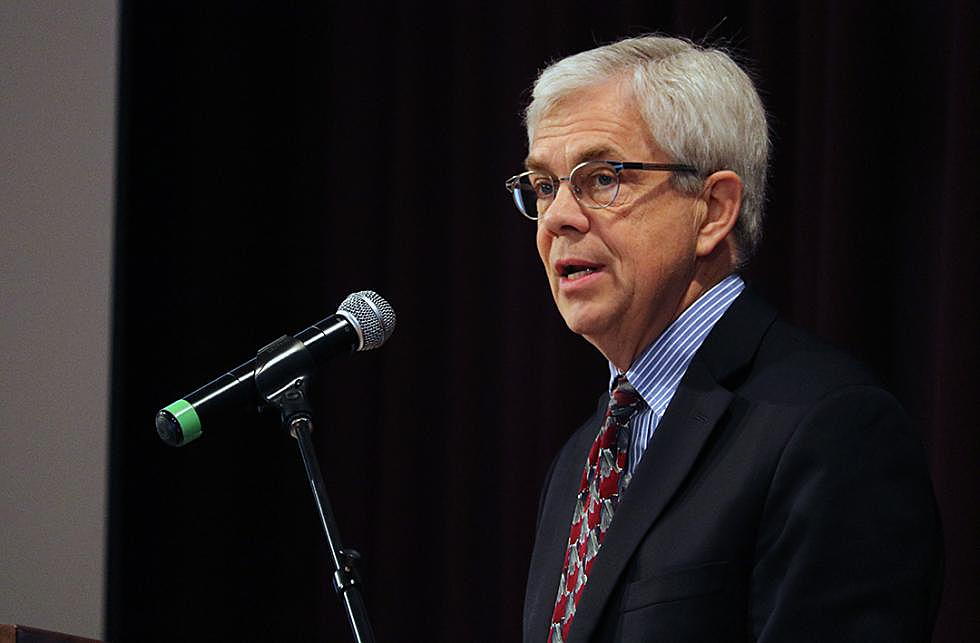
In Missoula, Cooney warns of budget cuts in November without legislative fix
If a special session of the Montana Legislature doesn't take place by the close of November to address the state's $227 million budget deficit, Gov. Steve Bullock will be forced to make deep cuts to state programs, Lt. Gov. Mike Cooney said Tuesday.
Addressing community leaders gathered for the Missoula Economic Partnership's annual investors' meeting, Cooney said the cuts will be across the board, reducing services for seniors, veterans and the disabled.
Permits issued for development will slow, infrastructure projects will stall, and college tuition will increase. Rural fire departments could lose funding and hundreds of state workers will lose their jobs.
“If the Legislature won't come to town and we get close to the end of November, the governor will have to implement those cuts that we've been talking about,” Cooney said. “If legislators refuse to work with us to find a more responsible solution, Gov. Bullock will be forced to make some or all of the cuts because of the law, and the state must rightfully have a balanced budget.”
Cooney said the state's economy is generally strong, with unemployment low and wages increasing. Tourism is healthy, innovation is on the rise, and Montana leads the nation in manufacturing growth.
Still, he said, the deficit resulted from a number of unexpected events, including the most expensive fire season in state history. Stagnant or declining market prices in oil, gas and agriculture, along with an outdated tax system, are also to blame.
Cooney said the governor's proposed budget, introduced in the 2017 Legislature, acknowledged the shifting economic factors. In doing so, it funded essential services and offered balanced increases in education, health care and infrastructure. It also offered a mix of new revenues and tax proposals.
The budget was rejected by the GOP-controlled Legislature. Bullock is a Democrat.
“Now we're facing a situation where Gov. Bullock only has authority to cut his way to a balanced budget,” Cooney said. “He's willing to trim back some spending and he's already done that. But he doesn't want to make the cuts that would ultimately hurt Montanans and Montana's economic future.”
In addressing Tuesday's gathering, Cooney challenged community leaders to encourage legislators to convene a special session to address the deficit and find new revenues before deep cuts are made to essential services.
But no agreement has been reached and the Republican majority has resisted most revenue enhancements. With the budget cuts looming and the political standoff holding strong, community leaders expressed a deep sense of angst regarding the future.
Among them, University of Montana President Sheila Sterns said the uncertainty is making it hard for the institution to plan its own budgetary future, even as it offers voluntary severance packages to qualified employees to bring down costs.
Other budgetary options at UM may be on the table depending on what happens at the state level.
“We do not know how quickly we need to respond,” said Stearns. “We're preparing each piece of our puzzle depending on what happens at the state level.”
Cooney said the timeline must move quickly, saying the state is currently unable to make payments now due at the end of the month to K-12 education. The money, he said, isn't in the bank.
“We would have to see some of the proposed cuts go into place before the end of the month,” Cooney said. “If there is going to be (a special session) to resolve the problem we have right now, it must happen in November and before the end of November.”
The proposed cuts to the state budget could also force counties across Montana to increase taxes at the local level, including Missoula County, where commissioners will be forced to either eliminate essential programs and jobs or raise taxes by more than $1 million.
Local programs in jeopardy include the Foster Child Heath Program, case management for children with special needs, and housing state inmates at the county jail. Programs for domestic and sexual abuse would be hit, as well as mental health services and funding for disaster and emergency services.
“The only thing the city and county can do to raise money is raise your property tax,” Commissioner Jean Curtiss said. “But we already submitted this year's budget, so there's going to be hole in our community if these cuts are made.”
Cooney said the governor shared those concerns.
“Every day we're going through the budget and looking at ways, if we have to make cuts, at how we do it so that it's least impactful on services and people across Montana,” Cooney said. “These cuts will hurt the folks in our communities that depend upon us the most. The governor needs a willing partner in the Legislature to get the budget back on track and into the black.”
